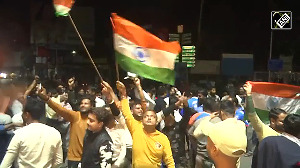Imagine this. Ramesh, an employee of a telecom (telco for short) company, is at your door. He says he can offer you data, video-on-demand and voice services - called Triple Play - all on your existing TV.
Not satisfied with your neighbourhood cable operator's service and monopoly status, the offer appears tempting. You are skeptical, though, about Ramesh's claim. After all, his company sold only phone and broadband connections till date.
Maybe, you need to take a second look. What the telco is offering you is called Internet Protocol TV or IPTV. Pray why? Telco majors, the world over, have laid thousands of kilometres of optic fibre. Closer home, there are nearly 350,000 route kilometers of optical fibre laid by BSNL, Reliance Infocomm, Bharti Tele-ventures and VSNL.
"However, 90 per cent of this optic fibre is unlit (not connected to the end-user equipment). How will telcos recover their investment and monetise this glut of bandwidth? IPTV is one way to use this bandwidth," reasons Sanjay Gopal, who leads the Communications and High Tech Industry group at Accenture India.
IPTV subscribers in the Asia-Pacific region (excluding Japan) are expected to grow to over 20 million by 2009. Siemens maintains the global market for IPTV technology could touch $1 billion by 2009.
The German company, which competes in the IPTV technology market with the likes of UTStarcom (which is building the IPTV architecture with Bharti) and an alliance between Microsoft (which has an alliance with Reliance Infocomm for the Microsoft IPTV edition) and Alcatel - has big hopes for China, as well as IPTV in general.
Can India be far behind? Union Minister for IT & Communications, Dayanidhi Maran, has already announced that Mahanagar Telephone Nigam and Bharat Sanchar Nigam will launch IPTV in Mumbai and Chennai this year.
"I have already told MTNL and BSNL about this. We should expect the first roll-outs by June 2006," Maran recentlysaid. Moreover, Reliance Infocomm and Bharti are the other players whose rollouts are expected by the year-end. They, however, were not ready to commit on the launch timing.
Badri Agarwal, president, Infotel, Bharti Tele-ventures, said: "We are currently testing the technology and collecting customer feedback. Based on the trial results, we will launch IPTV in due course.
"Airtel already offers voice, data and broadband services to over 1.2 million customers across the country. As we start offering IPTV to our customers, our biggest USP over players in the cable and DTH space will be the two-way service applications like time-shifted television, video-on-demand and interactive-gaming."
"IPTV deployments are expected to begin this year itself, It will grow much faster than people's expectations since everyone wants quality. This will happen like the earlier importance VCR gained over TV, due to the sheer quality of video output, not to mention the convenience VCRs offered.
"The last-mile connectivity would be either through cable or fibre and operators will offer services over a wired network to start with, even providing ADSL connectivity. However, as the technology matures, operators would offer last-mile connectivity over wireless networks, and Wi-Max is one of the possibilities," according to Ravi Sharma, MD, Alcatel India.
Cisco is currently pursuing IPTV solutions via enterprise networks for streaming live closed circuit video in the business, government, and educational sectors.
"Microsoft is developing a total solution to bring IPTV to the masses via software and hardware technologies for broadcasting and viewing digital video IPTV over broadband Internet connections," says Doug Hauger, Business & Marketing Officer, Microsoft India.
Hurdles to cross
First, broadband is the backbone of IPTV. And India has only around one million broadband connections till date. TRAI projects the number to rise to around 20 million by 2010. Second, the availability of the last mile is a factor that is most instrumental in determining what the future of broadband in India is going to be, according to Alok Shende, director, ICT practice, Frost and Sullivan.
Cable operators opine that they are much better placed than IPTV providers when it comes to the last-mile connectivity. "It's unrealistic to expect your telephone connection to give you broadband right away. There will need to be massive infrastructural changes," says Jagjit Singh Kohli, CEO, Siticable Network, a subsidiary of Zee Telefilms.
"Nowhere in the world will you see mass deployment of metro-ethernet backbone (which is what the private telcos have laid). Moreover, IPTV suffers from jitters. And talking about quality, IPTV will require 33 per cent more bandwidth than radio frequency (RF used by cable networks) for the same result with the same codes," he adds.
There can be stiff opposition from local cable operators who need to be "co-opted" rather than competed against, corroborates Gopal. Moreover, cable operators themselves are getting into triple play services
IPTV, DTH, Cable - 'Triple Play' for the Digital Home
Screen Digest, a research firm, suggests that IPTV is set to pose a significant challenge to established cable and satellite operators (read DTH). In the US, Triple Play services are offered by cable television operators as well as by telecommunication operators in the US.
'Triple Play' implies high-speed Internet, television (Video on Demand or regular broadcasts) and telephone service over a single broadband connection. With wirless, it's called 'Quadruple Play' and grouped services (triple and quadruple) are called multi-play. The fact is not lost on Indian players.
Hathway has a two-pronged strategy to combat new technologies like IPTV and DTH digitising our entire network and offering consumers more channels and content at the same cost, said a Hathway spokesperson.
"Also the set-top box is being offered on an easy-payment basis. The second part of our strategy is pushing high-speed broadband Internet into the homes and bundling the same with our digital product. Thus Hathway is able to offer in its universe analog cable TV services, digital cable TV services and bundling of digital cable TV services with high-speed broadband Internet.
Eventually Hathway will also move into Triple Play to combat DTH and other delivery platforms. Thus, as part of our offering we would be launching cable telephony services in the current year," the spokesperson added.
Siticable CEO Jagjit Singh Kohli said: "We have big plans for Triple Play services. Our advantage is that we can have video on RF and data and voice on IP (which currently is not adequate for good video output)." Tata Sky is investing in building a digital infrastructure in the country to offer a "superior television viewing experience to Indian households".
Vikram Kaushik, CEO, Tata Sky Ltd said, "We are committed to building a state-of-the-art DTH operation in India for which we have selected NDS to provide end-to-end solutions. This will enable us to transfer control and choice into the hands of subscribers".
Sunil Khanna, CEO, Dish TV, takes the competition in his stride. "The global phenomenon is that with increased TV penetration, there will be different distribution platforms. There are hundreds of households where TV has just not reached. It's not possible for IPTV to be everywhere - at least for now.
Moreover, there are always people who do not want to mix their telephone lines with their TV. In countries like Hong Kong, IPTV and cable co-exist. There's room for everyone," he concluded.
But there's no stopping it
Global IPTV revenues could top $17 billion by 2010, according to TDG Research. Smooth billing of services will win the day. The telcos have an upperhand since they already render these services. Bharti Tele-venture customers, according to Agarwal, "will get a single bill for all three services, carrier-class reliability and superior picture quality".
Over 50 per cent of country's telephony infrastructure is ready for IPTV. However, price points will be different as IPTV is a combined service telephone, TV and Internet, notes Sharma who adds: "Even though in 2006, we are just taking baby steps, India will lead the way in IPTV."
Demystifying IPTV
The services from a cable or satellite operator are "pushed" into your home. You have no choice but to keep on surfing channels if you want variety. Cable TV is a one-way communication. IPTV provides for a two-way communication. You request a program from the TV guide and the program is delivered to you.
With IPTV, your TV will connect to a set-top box that decodes the IP video and converts it into standard television signals. If a modem is added to the set-top box, it will provide a range of interactive services, including email, betting, games, shopping, information and even Internet access.
You can also choose which advertisements you want to see. Of course, what IPTV will do to the traditional 30-second advertising slot will be worth a watch.
Internet protocol TV or IPTV is different from Internet TV given that the user experience is bound to their living rooms and set-top boxes. The quality, though, will be superior since the content is digital (unlike most of the traditional TV content).
IPTV, unlike Internet TV, is primarily a TV experience rather than a PC experience and is meant as an alternative to cable and satellite.
With additional reporting by Rajesh S Kurup





